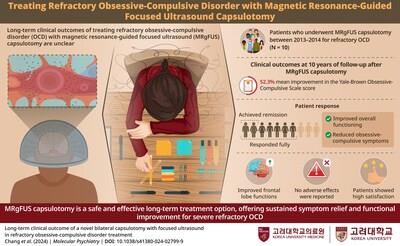(MENAFN- PR Newswire)
Researchers reported positive long-term results of bilateral capsulotomy for severe obsessive-compulsive disorder treatment
SEOUL, Dec. 5, 2024 /PRNewswire/ -- Obsessive-compulsive disorder (OCD) often resists conventional treatments, severely impacting patients' lives. Researchers conducted the world's first clinical trial of magnetic resonance-guided focused ultrasound (MRgFUS) capsulotomy in treatment-resistant OCD. Their 10-year follow-up study demonstrated sustained symptom improvement, functional gains, and high patient satisfaction, establishing MRgFUS capsulotomy as a safe and effective treatment and offering new hope to patients worldwide.
Continue Reading

Magnetic resonance-guided focused ultrasound (MRgFUS) capsulotomy provides lasting relief to patients with refractory OCD, according to the results from a clinical trial with a long-term follow-up of 10 years.
When conventional non-invasive treatments for psychiatric diseases fail, clinicians inevitably have to consider brain surgery. However, brain surgery for psychiatric diseases has long been taboo among the general public due to the infamous history of lobotomy. Thankfully, advancements in brain surgery in recent years are changing the narrative.
Bilateral capsulotomy, more commonly known as deep brain stimulation, is a form of brain surgery that has been garnering attention in treating treatment-resistant or refractory obsessive-compulsive disorder (OCD). Patients with refractory OCD experience a debilitating degree of repetitive behaviors and thoughts that they are unable to control, thus downgrading their quality of life.
A group of researchers from South Korea demonstrated that a novel non-invasive bilateral capsulotomy called magnetic resonance-guided focused ultrasound (MRgFUS) capsulotomy is efficacious and safe in treating refractory OCD for up to two years. MRgFUS capsulotomy non-invasively and precisely ablates tissues in the brain region of interest. However, the sustained efficacy of this treatment option was unclear.
Recently, the same research group conducted a long-term follow-up study of 10 years involving patients with refractory OCD who underwent MRgFUS capsulotomy. They reported that MRgFUS capsulotomy is an efficacious and safe treatment option for refractory OCD, with high patient satisfaction, even at 10 years, establishing its lasting positive effects in patients. Their findings were published in Molecular Psychiatry
on October 28, 2024.
This study has achieved multiple milestones in OCD research, offering hope to many patients experiencing refractory OCD. Accordingly, Dr. Jin Woo Chang from Korea University Anam Hospital who is a lead researcher in the study, exclaims, "These studies involve the world's first clinical trial for OCD with MRgFUS. The current study is also the world's first long-term follow-up study for OCD after treatment."
Interestingly, the application of MRgFUS capsulotomy may not be just limited to refractory OCD. Dr. Chang says, "The results from our clinical trial also imply the potential role of MRgFUS in managing other common psychiatric diseases, such as refractory depression, due to its simplicity and safety."
With the clinical application of MRgFUS capsulotomy on the horizon, Dr. Chang concludes, "With the rapid development of new surgical techniques like MRgFUS, it is possible to cure psychiatric diseases without additional complications. I am convinced this new technology will offer a new lease of life for those suffering and struggling from serious psychiatric problems."
Reference
Title of original paper: Long-term clinical outcome of a novel bilateral capsulotomy with focused ultrasound in refractory obsessive-compulsive disorder treatment
Journal: Molecular Psychiatry
DOI: 10.1038/s41380-024-02799-9
About Korea University College of Medicine
Website:
Contact:
Yoo-Jung Lee
+82 2 2286-1131
[email protected]
SOURCE Korea University College of Medicine
WANT YOUR COMPANY'S NEWS FEATURED ON PRNEWSWIRE?
440k+
Newsrooms &
Influencers
9k+
Digital Media
Outlets
270k+
Journalists
Opted In
GET STARTED
MENAFN05122024003732001241ID1108960421
Legal Disclaimer:
MENAFN provides the information “as is” without warranty of any kind. We do not accept any responsibility or liability for the accuracy, content, images, videos, licenses, completeness, legality, or reliability of the information contained in this article. If you have any complaints or copyright issues related to this article, kindly contact the provider above.